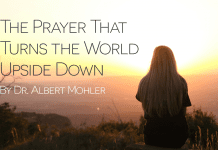by JON TYSON
I have struggled deeply with comparison my whole life, and I can pinpoint the moment its idolatrous shadow was cast over my heart. When I was in elementary school, I enrolled in a local track-and-field club. Much to the surprise of everyone around me, I ended up excelling as an athlete and breaking all kinds of state records. I was a fierce and dominant competitor, and I would come home to my parents with a chestful of blue first-place ribbons. I loved the feeling I got from lining up for a race and overhearing my peers say things like “I don’t even want to race. I know Jon is going to win.” I would run around that track like a junior Olympian god, head held high, unrivaled. I didn’t struggle with comparison then because, in my mind, I had no equals.
Then one morning a new kid came and watched me race. I can still see him there, standing next to his dad and looking straight into my eyes. I overheard one of my friends say, “What is he doing here? He’s the fastest kid I have ever seen.” At that, a new kind of emotion swept over me, one I could not articulate. It was a defense-based anxiety, and I didn’t like it. I won that race, but something had awoken within me. Comparison. The next week, to my surprise, that “fastest kid ever” joined our club, and the security of my world was invaded. As we walked up to the starting line for the first race of the day, everyone paused to watch. The gun went off, and I began to pump my small arms and legs like mighty pistons. I broke away and for the briefest of moments felt comparison melt away. But then, out of the corner of my eye, I saw something speed past me, the fastest kid ever. I spoke to my arms and legs, summoning them to new levels of performance. I gave that race all that I had, but it was not enough. For the first time in my young life, I was second. Embarrassed and ashamed, I went home in tears. Soon after that, I lost interest in athletics. Baffled, my parents tried to talk with me about what had happened. But how could an eight-year-old articulate the feeling of an ancient and primal force taking hold of his still-developing soul?
Comparison and the Soul
Comparison is the root of most of the misery we feel in life. Comparison makes it impossible to view ourselves from any sort of godly perspective. It is an absolute snare for the soul. Consider what comparison does to our view of others. First, when we compare ourselves with those we perceive to be better than we are in any given area of life, the comparison produces a sense of inferiority and insecurity. Whenever we see those people, they become reminders that we don’t have what it takes and are falling behind. We feel we must toil and strive to keep up. Yet the harder we try to do that, the more we’re caught in a cycle of despair. Comparison erodes our sense of worth and self-esteem. And it has a flip side. When we compare ourselves with people we perceive to be inferior to us, we are filled with a sense of superiority. The people around us become constant reminders of how good we are and how well we are doing, and judgment and pride creep in. Those controlled by forces of comparison have unstable and insecure souls.
” Comparison makes it impossible to view ourselves from any sort of godly perspective.”
Comparison and Community
Comparison not only creates an ulcer in the source of our self-worth but also makes it impossible for us to love deeply in community. As followers of Jesus, we are called to lives of sacrificial love, but it’s impossible to give our hearts and lives away to those whom we must better in order to determine our worth. Comparison is the enemy of compassion.
In James 3 we read about the consequences that are unleashed when we use others for our own security. “If you harbor bitter envy and selfish ambition in your hearts, do not boast about it or deny the truth. Such ‘wisdom’ does not come down from heaven but is earthly, unspiritual, demonic. For where you have envy and selfish ambition, there you find disorder and every evil practice.” Have you ever experienced the shock of discovering this at church? Expecting to find love, you find people treating others as commodities, manipulating and using them to feel good about themselves. And have you felt this sense of disorder and brokenness creating insecurity in you? Have you ever allowed your own practice of comparison to do this to others?
The Causes of Comparison
Where does this need to compare ourselves with others come from? Where does this congenital affliction of the soul find its roots? Looking closely at ourselves, at our hidden thoughts, deepest affections, and usual behaviors, we can identify several underlying causes of comparison.
Identity
One cause is our misplaced sense of identity. All of us have been confused at one point or another about where we derive our identity from. We receive part of it from our parents, part of it from our peers as we grow and interact, part of it from friendships and romantic relationships, and part of it from our workplaces. Small parts of us have been deeply shaped by the experiences and encounters we have had in life. But our culture makes it hard to rightly order our identity so that we know, at a foundational level, who we truly are. This lack of a solid center results in our putting identities on and taking them off depending on whom we are around. We feel the need to continually reinvent ourselves to keep up. We want to appear successful in the ways our culture demands, and it can be exhausting. Pretending to be doing well; posting only images of fun, glamor, and excitement on social media; and telling only the parts of our story that preserve our glowing image are a kind of modern armor, protecting our fragile hearts. We are terrified to be seen for who we are, where we are, and what we are actually struggling with.
” We have been given a new identity and a new call in our union with Christ.”
Fear of Missing Out
Another cause of comparison is our fear of missing out. Because we live in a constantly connected world, we are continually aware of the lives others are living around us. We are bombarded by a stream of images depicting leisure, travel, escape, sabbaticals, early retirement, cruises, road trips, graduations, promotions, parties, and fun. To compare the monotony of our ordinary existence with this litany of the spectacular creates a deep sense of unrest and dissatisfaction with our own lives. When we take our eyes off eternity, we are swept into a frenzied effort to keep up with others.
Finding Your True Identity
We have been given a new identity and a new call in our union with Christ. Jesus has given us every spiritual blessing and adopted us into his family. (see Ephesians 1:3-5) We no longer need to compare ourselves to others to find a sense of well-being because our sense of worth has been settled by Jesus’s love for us. We have been given fullness in him. Yet even though I know that is true, the world I live in still seeks to persuade me that something is missing. To help refute that lie, I need to marinate in my true identity in Christ.
Here is what it means to be in Christ:
I Am Accepted
• I am God’s child. (John 1:12)
• As a disciple, I am a friend of Jesus Christ. (John 15:15)
• I have been justified. (Romans 5:1)
• I am united with the Lord, and I am one with him in spirit. (1 Corinthians 6:17)
• I have been bought with a price, and I belong to God. (1 Corinthians 6:19–20)
• I am a member of Christ’s body. (1 Corinthians 12:27)
• I have been chosen by God and adopted as his child. (Ephesians 1:5)
• I have been redeemed and forgiven of all my sins. (Colossians 1:14)
• I am complete in Christ. (Colossians 2:9–10)
• I have direct access to the throne of grace through Jesus Christ. (Hebrews 4:14–16)
I Am Secure
• I am free from condemnation. (Romans 8:1–2)
• I am assured that God works for my good in all circumstances. (Romans 8:28)
• I am free from any condemnation brought against me, and I cannot be separated from the love of God. (Romans 8:31–39)
• I have been established, anointed, and sealed by God. (2 Corinthians 1:21–22)
• I am hidden with Christ in God. (Colossians 3:1–4)
• I am confident that God will complete the good work he started in me. (Philippians 1:6)
• I am a citizen of heaven. (Philippians 3:20)
• I have not been given the spirit of fear but of power, love, and a sound mind. (2 Timothy 1:7)
• I am born of God, and the Evil One cannot touch me. (1 John 5:18)
I Am Significant
• I am a branch of Jesus Christ, the true vine, and a channel of his life. (John 15:5)
• I have been chosen and appointed to bear fruit. (John 15:16)
• I am God’s temple. (1 Corinthians 3:16)
• I am a minister of reconciliation for God. (2 Corinthians 5:17–21)
• I am seated with Jesus Christ in the heavenly realm. (Ephesians 2:6)
• I am God’s workmanship. (Ephesians 2:10)
• I may approach God with freedom and confidence. (Ephesians 3:12)
What would happen to your spiritual confidence, joy, peace, and contentment if you began to live out of the staggering truths contained in this list instead of seeking to achieve satisfaction by what you can accomplish in comparison with others? What if you stopped measuring yourself by what you see on social media and in the lives of your friends and let these truths shape your path? What would happen if you lived for the upward call and made that call, instead of horizontal comparison, the measure of your success? It would be hard at first. We so often feel that we are falling behind others. But a fast from comparison and a feast on biblical identity could move your life into a place of freedom and delight. You would be more present to those you love and begin to notice things happening around you. You would be able to celebrate the success of others and delight in their favor rather than feeling like you were being overlooked or diminished in some way. Your envy would melt into love as you realize you are on the same team and seeking the same goal, and you wouldn’t perceive others as a threat. You may even find you are being liberated from the tyranny of comparison in your life.
Finding Your Call
The second step toward breaking the spirit of comparison is to respond to God’s call on your life rather than living for the expectations of others. Living for others creates what Ronald Rolheiser calls a “cancerous restlessness.” He writes, “So much of our unhappiness comes from comparing our lives, our friendships, our loves, our commitments, our duties, our bodies and our sexuality to some idealized and non-Christian vision of things which falsely assures us that there is a heaven on earth. When that happens, and it does, our tensions begin to drive us mad, in this case to a cancerous restlessness.”
We see this restlessness in Peter until he moves from fisherman to shepherd. And we see this same restlessness in our own lives. As a pastor I have seen people go to college and earn degrees in fields of study they care nothing about, all to keep their parents happy. I have seen others run from the call of God and become successful in business but miserable in their souls. And I have seen people discover tremendous freedom by finding the courage to respond to what God has called them to and put in their hearts, even though moving into their call was hard.
Have you fallen into this trap? Are you burdened by someone else’s call or expectations rather than God’s? What whispers in your soul have you been silencing out of fear or shame or pressure or expectation? What would happen if you amplified rather than silenced that call and embraced it with reckless abandon? Thomas Merton reminds us, “Each one of us has some kind of vocation. We are all called by God to share in His life and in His Kingdom. Each one of us is called to a special place in the Kingdom. If we find that place we will be happy. If we do not find it, we can never be completely happy. For each one of us, there is only one thing necessary: to fulfill our own destiny, according to God’s will, to be what God wants us to be.”
Jon Tyson is the author of The Burden is Light: Liberating Your Life from the Tyranny of Performance and Success (Multnomah) and a widely respected church planter and leader in New York City. Originally from Australia, Jon moved to the United States two decades ago with a passion to cultivate renewal in the Western Church. Jon has spoken at the Q Conference, Catalyst, and other key venues around the world. Jon’s preaching addresses culture and faith with a rare fusion of passion and depth. Jon lives in the Hell’s Kitchen neighborhood of Manhattan with his wife and two children. Visit him at churchofthecity.com and @jontyson.
Excerpted from The Burden Is Light by Jon Tyson. Copyright © 2018 by Jon Tyson. Excerpted by permission of Multnomah, an imprint of Penguin Random House LLC. All rights reserved. No part of this excerpt may be reproduced or reprinted without permission in writing from the publisher.

















